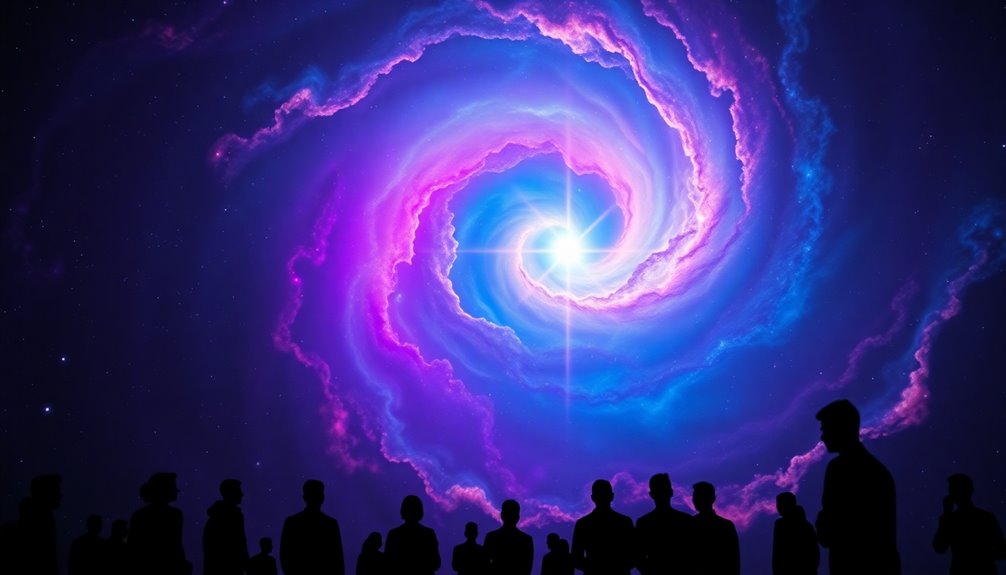Consciousness is often defined as your awareness and ability to think about experiences. However, scientists are still engaged in debates over its intricate nature. With about forty different interpretations, distinguishing between internal thoughts, external perceptions, and neural activity becomes challenging. Theories like Integrated Information Theory and Global Workspace Theory offer insights, but they raise further questions. The ongoing discussions also touch on the hard problem of how subjective experiences emerge from brain processes. If you're curious about what these differing perspectives mean for our understanding of consciousness, you'll find more intriguing angles to explore.
Key Takeaways
- Consciousness encompasses various meanings, leading to ongoing debates among scholars regarding its precise definition and nature.
- The distinction between phenomenal and access consciousness complicates the understanding of subjective experiences versus cognitive accessibility.
- The Hard Problem of consciousness questions how subjective experiences arise from neural processes, highlighting philosophical complexities.
- Modern theories like Integrated Information Theory and Global Workspace Theory offer differing perspectives on how consciousness emerges in the brain.
- Interdisciplinary approaches are necessary to bridge gaps between cognitive science, neuroscience, and philosophy in studying consciousness.
Historical Perspectives on Consciousness

Exploring the historical perspectives on consciousness reveals a rich tapestry of thought that has evolved considerably since the term first emerged. Originating from the Latin "conscius," meaning "knowing with," the concept of consciousness has undergone significant transformations, particularly through the philosophical works of Thomas Hobbes and John Locke in the 17th century. Their contributions laid the groundwork for modern definitions of consciousness, leading to centuries of debates on its nature.
Early philosophers like Descartes and Locke emphasized introspection and private thought, shaping definitions that focused on subjective experience. As cognitive science advanced, so did the interpretations of consciousness, incorporating metaphors like Herbart's magnet analogy and James's "stream of consciousness." This evolution parallels psychological advancements that sought to understand the phenomenon more profoundly.
Today, approximately forty distinct meanings of consciousness exist, fueling ongoing scholarly debates about clarity and consistency. Modern interpretations reflect a blend of philosophical insights and scientific theory, showcasing how the understanding of consciousness continues to evolve.
As you explore these historical perspectives, you'll appreciate the complexity and richness of thought surrounding consciousness throughout the ages.
Challenges in Defining Consciousness

Defining consciousness presents a complex challenge, with approximately forty distinct meanings complicating discussions among scholars. You might find that this multitude of definitions leads to confusion and ongoing scholarly debate. The tendency for circular reasoning exacerbates the issue, particularly when evaluating awareness criteria across different life forms.
| Aspect | Description | Challenges |
|---|---|---|
| Internal Cognitive Processes | Focus on thoughts and feelings | Subjectivity varies by individual |
| External Perceptions | How we interact with the world | Contextual interpretations differ |
| Neural Correlates | Brain activity associated with consciousness | Hard problem of consciousness |
| Functional vs. Phenomenal | Distinction between experience and function | Unclear definitions |
| Evolving Interpretations | Modern definitions reflect changing views | Continuous scholarly debate |
The "hard problem of consciousness," highlighted by David Chalmers, underscores the difficulty in explaining subjective experience despite correlating neural activity. As you explore the philosophy of mind, you'll realize that reaching a consensus on the definition of consciousness remains elusive, primarily due to these complex layers of interpretation and understanding.
Modern Theories and Models

Several modern theories and models aim to unravel the complexities of consciousness, each offering unique insights into how we experience awareness. Integrated Information Theory (IIT) suggests that consciousness is tied to the integration of information within a system, while Global Workspace Theory (GWT) posits that consciousness emerges from the broadcasting of information across a "workspace" in the brain.
Attention Schema Theory (AST) provides a framework that proposes consciousness arises from neural representations of attention, helping you perceive qualia rather than being qualia itself.
Cognitive scientist Ned Block distinguishes between phenomenal consciousness (P-consciousness), which relates to raw subjective experiences, and access consciousness (A-consciousness), which involves information available for reasoning and reporting.
Furthermore, Daniel Kahneman's work on cognitive processes differentiates between fast (System 1) and slow (System 2) thinking, linking these systems to different aspects of conscious experience and decision-making.
The ongoing debate in consciousness research underscores the challenges in identifying the neural correlates of consciousness (NCCs), as various theories propose different mechanisms that shape our understanding of subjective experiences.
Each theory enriches the dialogue, pushing the boundaries of how you comprehend consciousness.
Philosophical Implications and Debates

Philosophical implications surrounding consciousness spark intense debate, especially regarding its subjective nature. You'll encounter various perspectives as scholars attempt to unravel the complexities of consciousness.
Particularly, the discourse often revolves around these key points:
- The Hard Problem: This challenge, articulated by David Chalmers, questions why subjective experiences arise from neural processes. It highlights a significant gap in our understanding of consciousness.
- Phenomenal vs. Access Consciousness: Ned Block's distinction emphasizes the difference between the qualitative aspects of experience (P-consciousness) and the availability of information (A-consciousness), revealing how intricate consciousness truly is.
- Dualism vs. Physicalism: This ongoing debate pits Descartes' dualism, which separates mental and physical domains, against physicalism, which argues that consciousness can be fully explained by physical processes.
As you engage with these concepts, you'll see the necessity for interdisciplinary approaches—linking cognitive science, neuroscience, and philosophy—to bridge gaps in understanding.
Ultimately, grappling with the subjective nature of consciousness raises profound questions about the essence of human experience and the mind-body connection.
Consciousness Beyond Human Experience

Consciousness isn't just a human phenomenon; it exists across various forms of life, prompting us to reconsider what it means to be aware. You might find it fascinating that animals like dogs exhibit primary consciousness, allowing them to experience emotions and respond to their environment.
Meanwhile, secondary consciousness—the advanced self-awareness you associate with humans—sets us apart but doesn't negate the rich conscious experiences of non-human entities.
Research into the consciousness of plants and artificial intelligence raises ethical implications regarding how we treat these beings. If emotional and cognitive capacities vary across species, how should we define their subjective experiences? Additionally, recognizing the emotional manipulation often employed by narcissistic individuals can deepen our understanding of how consciousness manifests in diverse relationships.
This ongoing inquiry invites interdisciplinary discussions that challenge traditional views of awareness. As you explore these ideas, consider that understanding consciousness beyond human confines not only reshapes our definitions but also influences how we engage with the world around us.
The recognition of diverse forms of awareness encourages empathy towards all living beings and prompts a reevaluation of our responsibilities toward them. Ultimately, embracing this broader perspective on consciousness can lead to a more ethical and compassionate society.
Frequently Asked Questions
Why Can't Scientists Explain Consciousness?
Scientists struggle to explain consciousness because it involves complex interactions between neural processes and subjective experiences.
You might notice that while they can identify brain activity linked to awareness, they can't fully clarify why these neural patterns lead to personal experiences.
Theories like Integrated Information Theory and Global Workspace Theory offer insights, but they often fall short in bridging the gap between the physical and the experiential, leaving many questions unanswered.
What Do Scientists Say About Consciousness?
Imagine wandering through a vast, uncharted forest, where every path represents a different theory of consciousness.
Scientists explore these paths, with Integrated Information Theory and Global Workspace Theory as popular routes. They discuss the differences between phenomenal and access consciousness, while the "hard problem" looms like a towering tree, blocking their view.
As they navigate, they ponder the consciousness of animals and AI, seeking answers yet realizing the journey is just as essential as the destination.
What Is the Argument for Consciousness?
The argument for consciousness revolves around its complex nature and subjective experiences.
You'll find that scholars often debate its definitions, emphasizing what it feels like to be an individual, as noted by philosophers like Thomas Nagel.
Additionally, the distinction between phenomenal and access consciousness plays a crucial role in understanding how you process information.
Scientists also grapple with the hard problem of consciousness, seeking to explain the link between physical brain processes and your subjective experiences.
What Is the Scientific Problem of Consciousness?
Imagine you're trying to catch smoke with your bare hands—that's the scientific problem of consciousness. You're faced with the challenge of explaining how subjective experiences emerge from the brain's neural activities.
With around forty definitions of consciousness, clarity is elusive. While scientists search for neural correlates of consciousness, many theories lack depth, leaving you grappling with the explanatory gap that suggests a disconnect between objective data and subjective experience.
Conclusion
In the grand tapestry of consciousness, you find yourself at the crossroads of science and philosophy, much like Alice peering through the looking glass. As debates rage on, you're invited to explore the depths of your own mind and consider what it truly means to be aware. The quest for understanding consciousness may be as elusive as a Cheshire cat, but every question you ponder brings you closer to unraveling the mysteries of existence.










